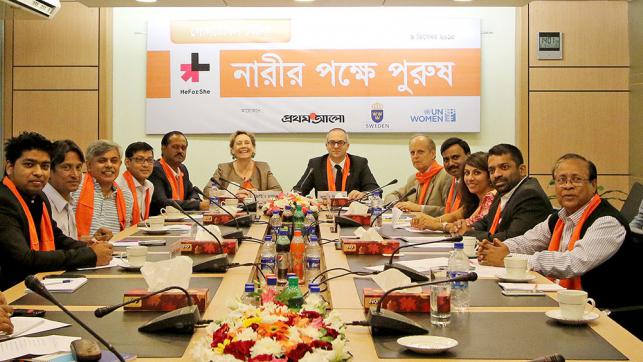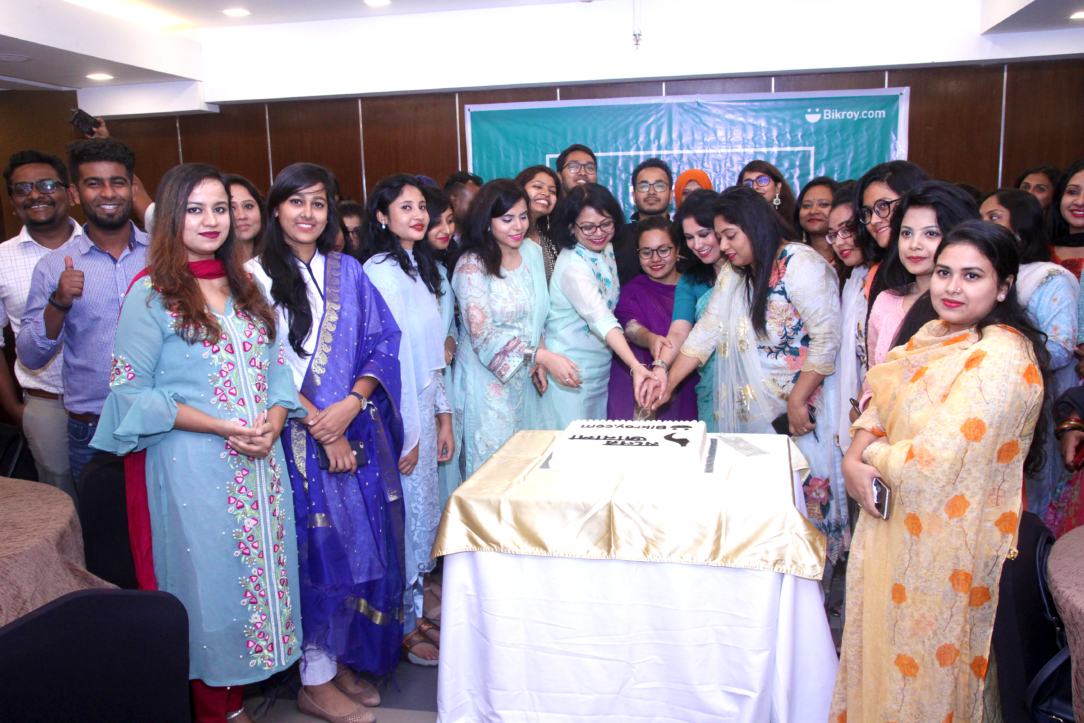Men Must Stand Up for Women

The rate of violence against women in Bangladesh, especially domestic violence, is alarming. According to a government survey, nearly nine out of ten married women are victims of violence by their spouses. There is institutional discrimination in various areas including distribution of property. However, the country has many positive initiatives which may contribute to changing the situation. For this, a concerted effort is needed. Rule of law must be assured. At the same time, awareness needs to be built, especially amongst men, against male domination over women.
Today on Wednesday, in a roundtable meeting organized by Prothom Alo, UN Women, and the Embassy of Sweden for the “HeForShe” initiative, participants discussed these issues and more. This meeting was organized as a part of a 16 day initiative to prevent violence against women.
In this roundtable discussion, held at the Prothom Alo offices in Karwan Bazar, participants, especially men, promised to change their role in their families as fathers, husbands or brothers. Additionally, they also mentioned how they would promote and apply the international campaign “HeForShe” in their organizations.
Prothom Alo is contributing as a partner in this campaign launched in March at the initiative of UN Women in Bangladesh.
His excellency Johan Frisell, Ambassador to Sweden, who served as the moderator at the discussion, emphasized the role of policy change in preventing violence against women. He also pointed out the importance of a long-term commitment from men to stand beside women and build awareness against male domination. Motiur Rahman, Editor of Prothom Alo and other representatives from the newspaper were also present at the meeting.
UN Resident Coordinator Robert D. Watkins mentioned early marriage as a big challenge in the prevention of violence against women. He expressed his concern on the ongoing initiative to change the legal marriage age for girls from 18 to 16 under special conditions.
Watkins went on to say that lobbying from the side of the donor agencies was ongoing in order to not reduce the marriage age in different levels of the government including ministerial. He emphasized on ensuring justice for women and increasing women’s leadership roles in different sectors including politics.
Christine Hunter, Country Head of UN Women, expressed her concern over domestic violence statistics in Bangladesh. Citing different examples of domestic violence as a violation of human rights, she said that women are victims of these forms of torture because they are not afforded their basic human rights. Ms. Hunter mentioned that it is although difficult to bring these changes about in society, it must be done. It is necessary to ensure male participation in the campaign to bring in these changes.
International Labor Organization (ILO) Director Srinivas B. Reddy emphasized ending gender discrimination in the workplace. He said that in the garments sector, 80 percent of the workers are female. However, most of them are in low paying jobs and associated with low efficiency. Men still hold all the leadership positions.
BGMEA vice-president Shahid Ullah Azim agreed, and said that although the percentage of women in the garments sector has increased, leadership positions are still male dominated. Even in middle-management, the representation of women is low. He emphasized increasing female participation and efficiency in the sector.
Actor Iresh Zaker said that we have to break out of the traditional ideas in the way women are represented in the media. He said, we should present women as role models in plays and documentaries, and we should bring changes in many ways by using social networks like Facebook.
The advocacy head of INCIDIN Bangladesh Nasimul Hasan argued that widowed women are getting priority in getting demesne only if they have capable sons. However if their firstborn is female, by law, they are prohibited from claiming demesne. He went on to say that 70 percent SME funds are awarded to male entrepreneurs. He mentioned this discrimination as systematic and emphasized on the need to change this through political influence. He urged the assembly members to present these issues in the parliament to end this discrimination.
The local assistant director of United Nations Development Program (UNDP) PalashKanti Das said, women’s participation in garments is contributing to economic development. The country’s position is now also better in Human Development Index. Still, violence against women continues to rise.
Marketing Director of Bikroy.com, Misha Ali said that the fallacy of domestic violence is that men expect women to change their behavior to prevent this violence. They do not wish to take any responsibility for this change themselves. He mentioned the initiatives taken by Bikroy.com to ensure gender equality in the workplace – arranging transportation for late night employees, mandatory gender sensititivy training for new employees, and increasing the ratio of female to male employees..
The founder of JAAGO Foundation, Korvi Rakshand stated that education is essential to ensure gender equality.
Associate Editors of the ProthomAlo, Abdul Qayyum and Anisul Hoque talked about the initiatives taken by Prothom Alo to end gender inequality including changed in policy. Abdul Qayyum emphasized on strict enforcement of the law, mentioning that although there are many laws to prevent violence against women which are not being followed.
Anisul Haque apologized as a male, mentioning the rising statistics of domestic violence. He promised to play his role in ending gender discrimination through various activities including in his writings.





